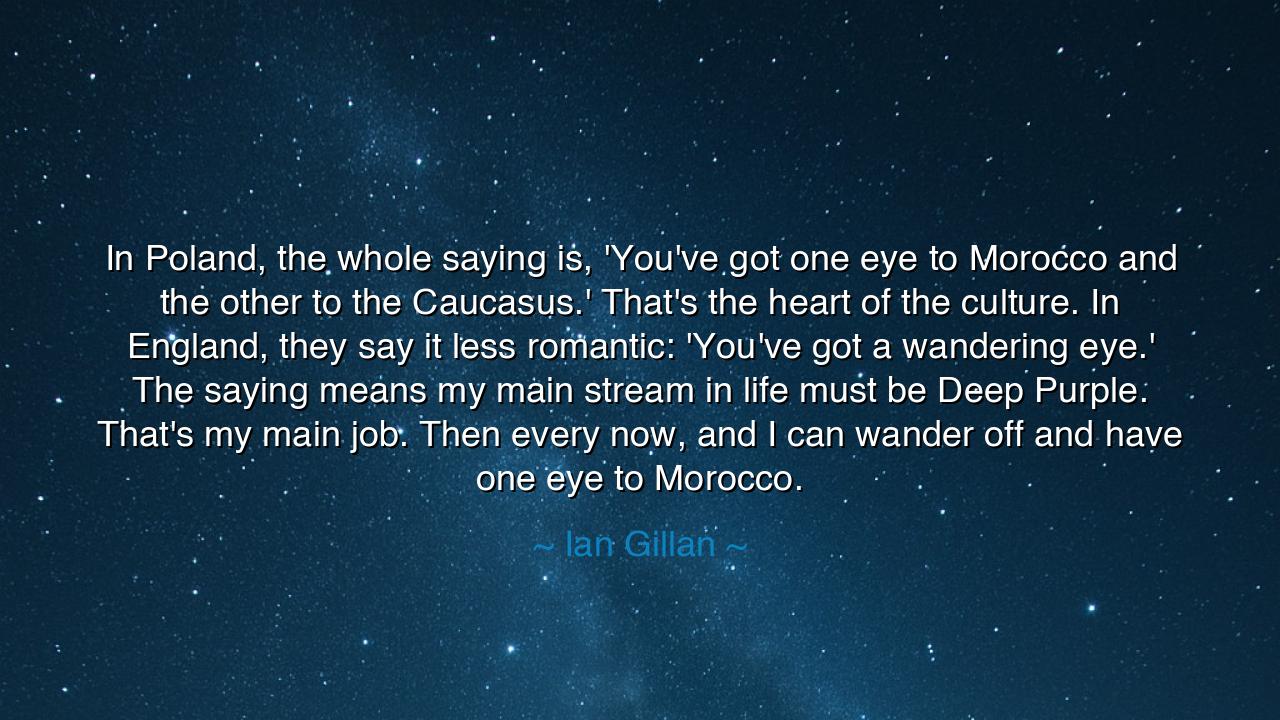
In Poland, the whole saying is, 'You've got one eye to Morocco
In Poland, the whole saying is, 'You've got one eye to Morocco and the other to the Caucasus.' That's the heart of the culture. In England, they say it less romantic: 'You've got a wandering eye.' The saying means my main stream in life must be Deep Purple. That's my main job. Then every now, and I can wander off and have one eye to Morocco.






In the words of Ian Gillan, the voice that thundered through rock’s great halls, there is given not only a proverb, but a vision of balance: “In Poland, the whole saying is, ‘You’ve got one eye to Morocco and the other to the Caucasus.’ That’s the heart of the culture. In England, they say it less romantic: ‘You’ve got a wandering eye.’ The saying means my main stream in life must be Deep Purple. That’s my main job. Then every now, and I can wander off and have one eye to Morocco.” These words shine like a parable, revealing the tension between duty and desire, between the work that defines us and the adventures that feed the soul.
The ancients, too, spoke of this duality. Odysseus was bound to his home, to Ithaca and Penelope, yet his journey carried him across seas, to foreign shores, to wonders and temptations. He was always tethered, but always wandering. So Gillan, rooted in Deep Purple, his main river of destiny, admits to a longing for the sidestream, for the detour, for the glance toward distant horizons. The proverb of Poland is more than geography—it is a symbol of man’s nature: one eye on the task before him, one eye on the mystery beyond.
To call the Polish version more romantic is to reveal how culture frames the same truth. The English phrase “wandering eye” suggests weakness, distraction, perhaps betrayal. But to say “one eye to Morocco and the other to the Caucasus” is to cloak the idea in poetry, to transform restlessness into curiosity, to honor the human impulse to roam. Gillan, as an artist, embraces this second form—for an artist must be rooted in his craft, but never chained against imagination.
History gives us mirrors. Consider Leonardo da Vinci. His main stream was art, the great paintings that defined his genius, yet his other eye wandered into anatomy, engineering, flight, and philosophy. To some, he seemed unfocused, but to history, he became the Renaissance man, enriched by his detours. His one eye was on the canvas, but the other was forever cast toward Morocco and the Caucasus, toward the farthest reaches of human curiosity.
The deeper meaning of Gillan’s words is that the soul with only one focus risks sterility, and the soul with only wandering risks ruin. Balance is the secret. A river must have its main course, or it will dissipate into swamps—but it may send tributaries into the land, bringing fertility far beyond its banks. So too must we have our main stream—our calling, our duty, our craft—and yet allow ourselves the freedom to explore side paths, for it is there that the heart finds refreshment.
The lesson is clear: do not despise your main stream, for it is the anchor of your life, the foundation of your legacy. But do not fear to glance outward, to wander with your second eye, to explore what may seem unrelated or frivolous. For it is in those wanderings that inspiration is born, and when you return to your main river, you will find it enriched with the waters of distant springs.
Therefore, O listener, walk as Gillan counsels: be steadfast in your labor, faithful to your calling, but keep your second eye alive, ever seeking, ever curious. Let one hand hold to your duty, and the other stretch toward adventure. For in this balance lies the secret of a life both grounded and vast, both disciplined and free. And when others accuse you of distraction, remember the wisdom of the ancients: the soul that gazes only at what is near loses sight of the horizon, but the soul with one eye on its duty and the other on the distant mountains lives a life both fruitful and full of wonder.






AAdministratorAdministrator
Welcome, honored guests. Please leave a comment, we will respond soon